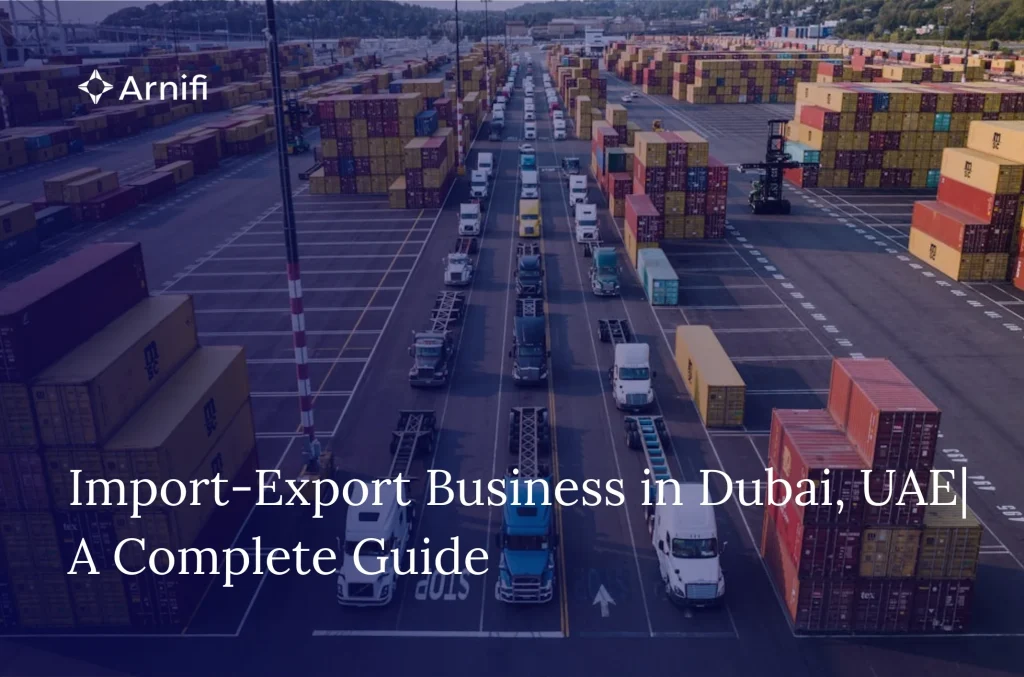Import-Export Business in Dubai, UAE| A Complete Guide
by Rifa S Laskar Oct 24, 2025  7 MIN READ
7 MIN READ

Dubai has become a global trading powerhouse & launching an import-export business in Dubai, UAE gives you access to international markets, tax benefits & world-class infrastructure. From electronics to food products, Dubai’s trade framework keeps your operations easy & efficient
Table of contents
- 1. Introduction
- 2. Why Dubai is Ideal for Import-Export Businesses
- 3. Eligibility to Start an Import-Export Business in Dubai
- 4. Types of Import-Export Licenses
- 5. Steps to Set Up an Import-Export Business
- 6. Estimated Costs
- 7. Required Documents
- 8. Practical Tips for Success
- 9. Common Mistakes to Avoid
- 10. FAQs
- 11. Conclusion
1. Introduction
If you want to expand globally, then an import-export business in Dubai, UAE, is one of the smartest steps you can take. Make your strategy from the very first day, you need to know the legal requirements, costs & best practices before starting a business. Dubai’s strategic location, business-friendly policies & infrastructure make it ideal for companies that are targeting international markets.
This article covers everything about launching an import-export business. This includes eligibility, license types, setup steps, costs & practical tips.
2. Why Dubai is Ideal for Import-Export Businesses
- Strategic Location – Dubai is between Asia, Europe & Africa, which gives you direct shipping routes worldwide, which is perfect for any import-export business
- Free Zones Advantage – Free zones allow 100% foreign ownership, no personal income tax & have comparatively simplified customs procedures
- World-Class Logistics – Ports like Jebel Ali and Dubai Airport Free Zone (DAFZA) ensure easy imports and exports due to the best infrastructure
- Business-Friendly Regulations – Licensing procedures are clear and transparent, which makes operations hassle-free
- Access to Global Markets – Dubai’s trade agreements open doors to over 200 countries, which is ideal for your import-export venture
3. Eligibility to Start an Import-Export Business in Dubai
Before launching your business in Dubai, you need to ensure you meet these requirements:
- You must be at least 21 years old to legally register and operate any business
- You must hold a valid UAE residence visa to meet local business regulations
- You need a registered UAE trade license or sponsorship to legally conduct any trading activities
- Physical office space is required in some free zones to complete registration and license
- You must pass a good character check to ensure compliance with UAE legal standards
4. Types of Import-Export Licenses
Dubai provides licenses tailored for your import-export business:
| License Type | Purpose | Key Benefit |
| General Trading License | Trade multiple products | Flexibility to import/export various goods |
| Specialized Trading License | Trade-specific product category | Focused operations, lower costs |
| Free Zone License | Operate within a free zone | 100% foreign ownership, no customs duty inside the zone |
5. Steps to Set Up an Import-Export Business
When you’re launching your business in Dubai you require the following steps:
- Choose Business Activity – You need to clearly define which products or goods you plan to import or export. This helps in market demand, profitability & compliance with UAE trade regulations before moving forward.
- Select Jurisdiction – Now decide whether to operate in mainland Dubai or a free zone based on ownership structure, ease of licensing & long-term operational flexibility.
- Reserve Trade Name – Pick a unique trade name that reflects your business identity while strictly following the UAE name rules to avoid delays during the license application process.
- Prepare Legal Documents – Now gather essential documents, which include passport copies, UAE residence visa, No Objection Certificate (NOC) & a well-structured business plan for authorities.
- Apply for Trade License – Then submit your complete application to the Department of Economic Development (DED) or the relevant free zone authority to secure your license legally.
- Obtain Customs Registration – Then register with UAE customs to ensure your imports and exports comply with all regulatory requirements and to avoid shipment delays or fines.
- Open Bank Account – Now open a corporate bank account in the UAE to handle all the financial transactions easily and maintain proper records for your trading operations.
- Lease Office Space – Then secure physical office space as required by licensing authorities, even in free zones, to validate your business location and complete registration.
6. Estimated Costs
| Expense | Estimated Cost (AED) | Notes |
| Trade License | ~10,000 – 15,000 | Depends on whether it is the mainland or the free zone |
| Office Rent | ~15,000 – 50,000 | Annual lease, varies by location |
| Customs Registration | ~2,000 – 5,000 | Mandatory for import/export |
| Visa Costs | ~5,000 – 7,000 per visa | Includes processing and medical |
Total Estimated Setup Cost: AED ~ 30,000
7. Required Documents
- Passport copies of owners and partners – You need to provide clear, valid passport copies of all business owners and partners for identity verification and legal registration purposes.
- UAE residence visa copies – Then submit copies of your valid UAE residence visa to follow the local regulations and business authority requirements.
- No Objection Certificate (NOC) from sponsor if applicable – A NOC from your sponsor may be required to approve business activities legally.
- Tenancy contract or office lease agreement – You must provide an official lease or tenancy contract as proof of a physical business location for the license.
- Bank reference letter – You will obtain a letter from your bank that confirms your account status and financial reliability for conducting any business operations.
- Business plan (especially for specialized licenses) – Then prepare a detailed business plan that highlights your objectives, target market, products & operational strategy for authorities
8. Practical Tips for Success
- Partner with a reliable logistics provider for smooth imports and exports.
- Keep detailed records of customs documentation to avoid penalties.
- Understand regulations for specific products, especially food, electronics & chemicals.
- Attend Dubai’s trade fairs to connect with global buyers and suppliers.
9. Common Mistakes to Avoid
- Ignoring Free Zone Benefits – Many new business owners skip free zones, unaware that these zones allow 100% ownership, tax advantages & simplified customs procedures. Missing any of these benefits can lead to unnecessary costs and slower operations
- Poor Cash Flow Planning – Import-export transactions often involve delayed payments, international shipping & customs duties. If you maintain sufficient working capital, it can cause operational problems, missed opportunities, or delays in fulfilling orders, which impacts your business credibility
- Skipping Customs Knowledge – Understanding customs rules and regulations is essential. Even minor mistakes in documentation or shipment compliance can result in fines, shipment delays, or confiscation. This can cause disruptions to your import-export business in UAE
- Ignoring Trade Agreements – Dubai has multiple bilateral and free trade agreements that reduce tariffs and simplify imports and exports. Overlooking these opportunities can increase costs and limit your business’s competitiveness internationally
10. FAQs
Q: Can a foreigner own 100% of an import-export business in Dubai?
Yes, in free zones, full foreign ownership is allowed. Mainland ownership may require a local partner.
Q: How long does it take to get a trade license?
1-3 weeks in free zones and 2-4 weeks in mainland Dubai.
Q: Are there restrictions on the type of products I can import/export?
Yes, items like chemicals, alcohol & pharmaceuticals require special approvals.
Q: Is a warehouse necessary to start?
Not always. Some free zones allow operations without a warehouse if logistics partners are used.
Q: How many licenses are needed for multiple products?
A general trading license allows trading multiple products under a single license, simplifying your business
11. Conclusion
Starting an import-export business in Dubai, UAE opens doors to global markets, efficient logistics & a stable, tax-friendly environment. Dubai’s strategic location between Asia, Europe & Africa gives businesses unmatched access to international trade routes, while its free zones provide 100% ownership, simplified customs & regulatory clarity. Success in this market requires careful planning, understanding licensing requirements & compliance with UAE trade regulations. From selecting the right business activity to registering your trade license, which obtains customs approvals, are maintaining financial discipline, each step shapes the efficiency and growth of your operations. Practical knowledge of market demand, shipping procedures & trade agreements can give your business a competitive edge. Arnifi supports entrepreneurs and investors at every stage of their journey by handling business setup and trade license applications, providing office and warehouse solutions, assisting with visa allocation and HR needs, and guiding compliance and customs processes to ensure easy operations. Partner with Arnifi to navigate Dubai’s trading ecosystem confidently and launch your import-export business successfully.
Top UAE Packages

Related Articles
Top UAE Packages



